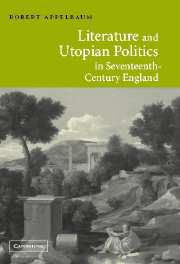Book contents
- Frontmatter
- Contents
- Acknowledgments
- Introduction
- Chapter 1 The look of power
- Chapter 2 Utopian experimentalism, 1620–1638
- Chapter 3 “Reformation” and “Desolation”: the new horizons of the 1640s
- Chapter 4 Out of the “true nothing,” 1649–1653
- Chapter 5 From constitutionalism to aestheticization, 1654–1670
- Notes
- Index
Chapter 3 - “Reformation” and “Desolation”: the new horizons of the 1640s
Published online by Cambridge University Press: 22 September 2009
- Frontmatter
- Contents
- Acknowledgments
- Introduction
- Chapter 1 The look of power
- Chapter 2 Utopian experimentalism, 1620–1638
- Chapter 3 “Reformation” and “Desolation”: the new horizons of the 1640s
- Chapter 4 Out of the “true nothing,” 1649–1653
- Chapter 5 From constitutionalism to aestheticization, 1654–1670
- Notes
- Index
Summary
“THAT NEW UTOPIA …”
There were signs of a change in the offing even before the political crises brought on by the Scots' or Bishops' War, when Charles led an army against Scottish Presbyterians to enforce Anglican rituals and ended up suffering a humiliating defeat. The defeat led to Charles's having to call a Parliament after over ten years of personal rule. In summoning Parliament he put into motion a chain of events that would lead to his own execution and the declaration of a republic – in a sense, the single most utopian thing ever attempted in British political history.
But signs of change, again, appear even before then. In 1630 the restless quasi-Baconian reformer Samuel Hartlib set up a household in London, which was to be a center for progressive intellectual projects for the next thirty years, and Hartlib was already writing to his friend John Dury overseas of a society of like-minded “reformers” that was gathering around him. These included the educator John Pell, the Puritan ministers William Speed, William Sedgwick, John Cotton, and John White, and the doctor of divinity William Twisse, the associate and executor of the late Joseph Mede. Hartlib had earlier been associated with a somewhat mysterious society of scholars on the Continent whose leading spirit was in fact Johann Valentin Andreae; the society had adopted the name Antilia, from Andreae's Christianopolis.
- Type
- Chapter
- Information
- Literature and Utopian Politics in Seventeenth-Century England , pp. 102 - 139Publisher: Cambridge University PressPrint publication year: 2002



